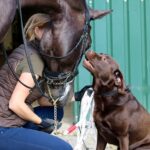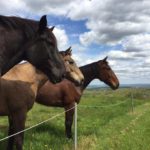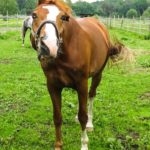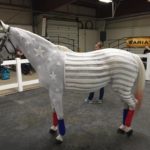Transferring nervous energy to your horse is a lot easier than you think. In fact, you don’t have to be on, or even touching your horse to transfer your nervous energy, anxiety, or fear. According to a study done by the University of Sussex, published in February of 2016, “horses are able to recognize and respond in a functionally relevant way to heterospecific (human) facial expressions of anger. Horses demonstrated right-hemispheric biases towards angry stimuli (preferentially viewing images with the left eye), which were positively correlated with both avoidance duration and mean increase in heart rate; further, horses displayed a faster overall increase in heart rate to angry, compared with happy stimuli. There were also non-significant trends to perform more stress-related behaviours towards angry stimuli.” So basically, horses can read your facial expressions and will respond accordingly. Had a bad day at work? Got stuck in traffic on the way to the stables? Had a fight with your spouse before leaving the house? Well wipe that scowl off your face before calling your horse in from the field, or he/she will know and adjust their behavior accordingly!
Our horse’s ability to read our facial expressions is more of an interesting side fact. Our real concern should be transferring our nervous energy, anxiety, nervousness, and stress directly to our horses when we’re on them. This happens because horses have acute sensory perception. Their central nervous system is supplied with input from an extensive array of sensory receptor cells. The number of sensory receptors varies from hundreds to thousands per square inch of skin on different parts of their body. A horse’s whole body has the same sensitively as your fingertips do. Have you ever watched your boy or girl twitch a fly off from their back? Imagine that- they can feel the legs of a tiny fly on their 1400 pound body! That’s just one way their skin sensors work. The sensors inside their skin also sense hot and cold.
I believe horses can do more than just feel our subconscious tightening grip on the reins, or our legs squeezing just slightly harder than normal as we egg them on when we’re nervous. They can tell how we’re sitting vs. normal (when we’re not nervous) because of our weight distribution on their bodies, they can tell how high, or low, we’re holding the rains, where your feet are vs. normal, and how hard you’re pressing on the stirrups. Their amazing hearing ability can even perceive changes in your voice (either when you’re talking to them from the saddle, or talking to someone else while you’re mounted- i.e. when talking to your coach right before your round). All of this is done subconsciously by us, but easily picked up upon by our horses.
So, are you currently transferring nervous energy to your horse or at risk of doing so? That depends… Are you a beginner rider, have you recently suffered a riding accident, do you compete (show jumping, dressage, barrel racing, cross country, really anything with a horse :-), or are you just a nervous, stressed out, anxiety prone person naturally? If you answered “yes” to any of the above, you have at some point, and probably will continue to transfer nervous energy to your horse. Is that a big deal? It’s hard to know, and I don’t think you ever will know, how your horse would have performed in a competition if he hadn’t picked up on your nerves. If you’re a competitive rider, consider the fact that your horse is probably already a bit nervous in his/her own right, given the competitive environment. There’s the noise, the crowds, the arena, all the other unfamiliar horses, new smells, etc. that they are already contending with. For race horses, they use blinders and ear plugs, but there’s nothing they can use to stop the jockey from transferring his/her own nervous energy from a physical standpoint. If you’re a beginner rider or someone who’s been in an accident and “getting back on the horse,” consider that transferring your nervous energy (from fear) to the horse you’re attempting to ride, could theoretically make them a more difficult “ride” and less attentive to your commands. That, in turn, will make you more nervous. It can become a vicious cycle depending upon the horse (some have better temperaments and coping skills than others).
Speaking of coping skills…. so what do we do about the possibility, or fact, that we are transferring nervous energy to our horse? We can’t start monitoring and checking everything (our posture, our grip, our voice, etc.) right before we’re about to show or race. It would make US crazy, paranoid, and even more stressed, and in fact, make the situation worse. Plus, as I mentioned earlier, it’s almost all subconscious behavior, and super subtle differences. Only our horse, who knows us all to well in our calm, relaxed, non-competitive state, can pick up on the differences.
Behold, there is a solution, and I will share it with you. If done correctly, at the right time, it will leave you in a relaxed state, both physically and mentally, and there’s an added bonus that I will explain in a moment. The answer is meditation. Normally, mention meditation, and people will think of gurus, awkward sitting positions, repetitive mantras, and unusual “mood” music. Well what if I told you there was a technique that didn’t require, or use, any of the above, doesn’t require an app, doesn’t require a teacher, takes only 10 minutes to do (though more is better), and is free to learn? It can actually be done while sitting on a horse, though I suggest you do it 10 minutes before mounting, for two reasons: 1) That way the horse never has a chance to sense your nerves/fear and 2) because you will be left in a very relaxed state, you will want to give yourself a few minutes to re-acclimate before your ride. The man who coached me on this method recently made it widely available to those outside his practice, for free, to help people suffering from TMJ/TMD, (due to stress and anxiety) in the form of a free YouTube video (which I’ve posted below). However, the same simple technique, called “The Cargotts Method”, (which is why it is practical) can be used by any horse rider- competitive riders, beginners, and those “getting back on the horse” after an accident, injury, or both. It is effective and absolutely works. Now here’s the bonus I mentioned. If you incorporate The Cargotts Method into your daily life (i.e. you do it every day), you will gain a type of clarity, and perception, that will give you a competitive edge over your competition (in addition to a host of benefits not related to riding/competing). When you’re out on the course, you will have a heightened awareness, and it will almost be like you can see the jumps or barrels coming in slow motion, in order to time your jumps, cuts, and turns more precisely, and on point. You have to try it to believe it, but the benefits of The Cargotts Method (and meditation in general), and all the hype you’ve heard about it, are real. Competitive riders who use The Cargotts Method to gain an edge, rarely talk about it for obvious reasons. Not only does meditation indirectly make them better riders, but their horses are calmer than yours. Or at least they were, until now! Riding caps off to J.R. at Cargotts Consulting LLC for creating this video, and we’ll take a little “dressage salute” too, for passing it along to the horse community 🙂 Happy Riding!!
p.s. J.R. is not a “horse guy,” but as a life strategist, he can help you with just about everything else in your life, from stress management to relationships. I doubt you’ll need extra help/coaching with The Cargotts Method and visualization (since the video is pretty detailed, and it’s such a simple method compared to other types of meditation), but he does offer it over Skype for international clients, and those living in the United States.
The Cargotts Method of Meditation






Makes sense- if you are nervous, your horse will sense it and become uneasy and start looking around for the danger or what they think is spooking you!
My horse used to be difficult at times, but the minute I changed the tone of my voice, he stopped misbehaving and listened, as he knew I wasn’t going to tolerate it. He was like a toddler on his last warning before time-out! Very smart boy!
Very informative and interesting article. I have noticed that my horses pickup on my energy and moods. They are very intuitive animals. I haven’t tried meditation, but hear a lot of positive things about it. This may be the motivation I needed to give it a try, especially if it can give me an edge when competing.